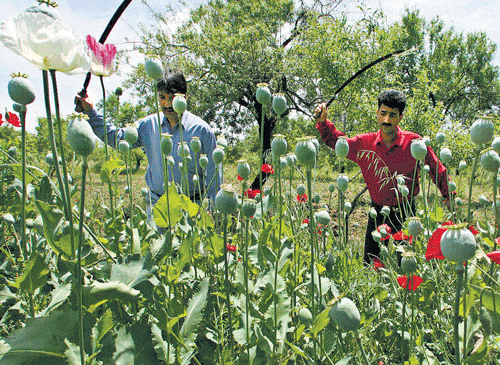
Serving drinks made of opium and poppy husk, locally known as Doda Post, has been a long-standing custom during ceremonies like marriages in the Marwar region of western Rajasthan, that mainly comprises border districts like Jodhpur, Barmer and Jaisalmer.
What initially was a tradition in western Rajasthan has now become a severe addiction among people, putting thousands of lives, including youth, at risk. This is also one of the reasons that despite pressure from the Union Government and the United Nations (UN), the state government has sought five more years to shut down all licensed shops in poppy husk in Rajasthan.
A majority of men are in the grip of Doda addiction in the Marwar region. This is evident as any shortage in supply of poppy husk at licensed government shops leads to a major law and order situation in border districts. As possession and supply of opium and poppy husk are illegal, the state government is operating licensed shops to ensure survival of thousands of addicted people in the area.
So much so, the shortage of poppy husk becomes a big issue in elections in western Rajasthan. To woo the voters, political leaders, during every election, promise adequate supply of poppy husk at the government shops. Though making such a promise is against law, no action has ever been taken against any leader as consumption of poppy husk has become a part of life in western Rajasthan.
There have been a number of incidents wherein high-profile people and custodians of democracy could not dare to ignore this age-old tradition of consuming and serving opium at their ceremonies. A few of them are also facing legal proceedings due to political rivalry. A case was registered against former foreign minister Jaswant Singh and nine
others under the Narcotic Drugs and Psychotropic Substances (NDPS) Act for allegedly serving/consuming opium at a family function in his ancestral village. Jaswant Singh was alleged to have personally served opium drink to guests, which is a local ritual.
“Consumption of such drinks is a custom on some occasions. Over a period of time, it has became a habit and as a result consumption of poppy husk has also increased. It has evolved into lifestyle and anyone talking of de-addiction or closing down the poppy husk shops is seen as an enemy trying to disturb the routine life of people,” a legislator from Barmer told Deccan Herald on condition of anonymity. This is the reason most political leaders during election greet the people by serving such drinks at their camp office sand in public rallies they promise adequate supply of poppy husk, he added.
In a bid to reduce consumption of poppy husk, the state government, about a decade back, issued the permits/licence to the people. Many of them were issued permits on the recommendation of doctors, who certified a person as addict and prescribed minimum consumption of poppy husk for his survival. The quantity of poppy husk to be given on permits was mostly fixed as per the advice of the medical experts. However, these permits have not been renewed for several years and the issue has rocked the Assembly on many occasions.
Deaddiction drive fails
Every time, the government announces that it’s running massive de-addiction campaign in the region and it won’t renew the permits to promote the consumption. Medical and Health Minister Rajendra Rathore said that there have been 17,400 permit holders in the state since 2001 and there will be no renewal.
“Every year, we have been reducing the permits by 25-30 per cent. As per the policy of the state and union governments, our intention is to bring this number to almost zero. We are also running continuous campaign and ensuring basic support to de-addict the people,” said Rajendra Rathore.
If local legislators are to believed, there has been a rampant misuse of permits to get more quantity of poppy husk. Considering the situation, the government stopped renewal of these permits since 2001 and started reducing the prescribed quantity in the old permits.
The state government is under immense pressure from the Centre and the UN to shut down the poppy husk shops. The Union government, on the basis of UN guidelines, has asked Rajasthan to close all poppy husk shops by March, 2015. Going by the present situation in the Marwar Region, the state government is not in a position to implement it and has decided to appeal the UN to extend its deadline for ending the use of poppy husk as narcotics in the state for five more years.
India is one among many nations which has signed a treaty with the UN to end the consumption of poppy husk as narcotics in India. “As per the UN guidelines and restriction, the use of poppy husk as narcotics is to end by March 31, 2015, but the state government will submit an appeal requesting for an extension by five more years,” said Rajendra Rathore.
He said that a team from the All India Institute of Medical Sciences was in Rajasthan in 2009 to study the addiction among the people in western Rajasthan and found that poppy husk was very harmful for human beings.
The state government has also reduced the cultivation of opium in the state. “Around 13,209 quintal of poppy husk is produced every year and 9,840 quintals is already lying in the godowns. The government has a permanent programme to wean away people from poppy husk,” said Rajendra Rathore.
The minister admitted that use of poppy husk is now a common addiction among rural folks in the state. He said that 648 de-addiction camps have been planned in 17 district hospitals of western Rajasthan this year. Besides several NGOs and other organisations have been roped in to end consumption of poppy husk in the state.